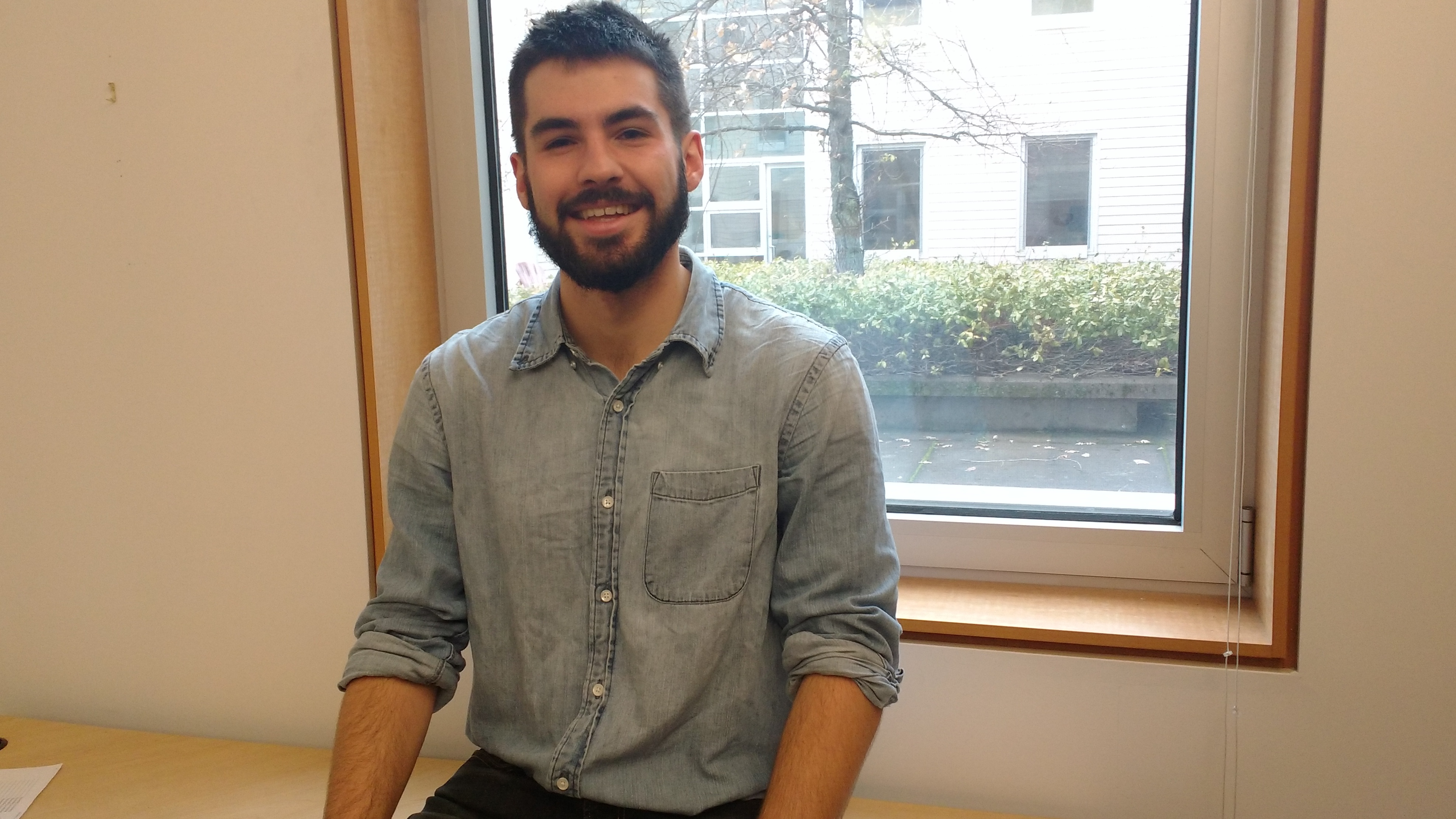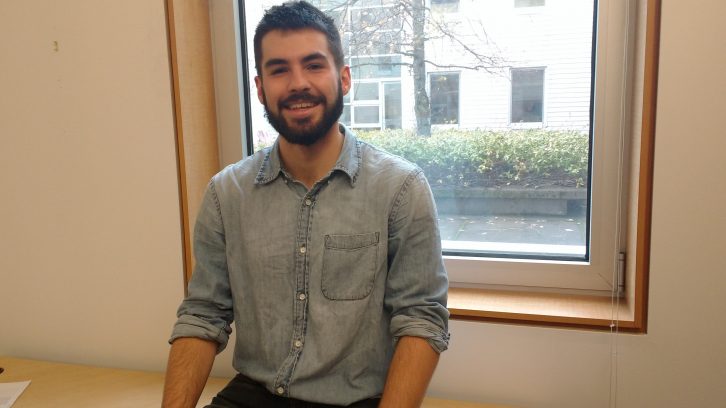Education
Meet the philosopher teaching cosmology to convicts
"A lot of the time, those that are in prison are infantilized or demonized."

caption
Harry Critchley in his office at Dalhousie.
caption
Harry Critchley in his office at Dalhousie.Upon first meeting Harry Critchley, one gets the impression that he is quite mild. But when he begins talking about prisons, he suddenly becomes vivid — it’s as if an artist suddenly decided to put a lot more energy into their drawing.
At his home in Halifax, he describes pitching the idea of learning about an ancient Greek philosopher to a group of inmates in Burnside.
“At first, eyebrows went up. So I’m like, ‘okay, Sophocles was a military general. His plays have been used as a way to talk to veterans about PTSD; they’ve been used in prisons to talk about feelings of isolation and betrayal,” says Critchley. “There’s a lot going on here, and if you give this a chance, I think you might really like it.’ And then the guys got curious!”
He directs the Burnside Prison Education Program, which he started in October 2015. The program aims to provide programming such as philosophy and poetry to the inmates there. Critchley is part of a movement of people who are working to support prisoners in Nova Scotia.
The Signal’s Caitrin Pilkington sat down with Critchley to discuss his experience bringing courses about friendship, morality and feminist theory to inmates at both the Central and Northeast Nova Scotia Correctional Facilities.
Q. What was the initial response to your idea?
A: (The staff at Central Nova Scotia Correctional Facility) were initially pretty skeptical about it. They said, “I don’t think most of the guys in here are smart enough to do philosophy; you’re probably just wasting your time.” A really high percentage of the population are functionally illiterate. About 25 to 30 per cent of the guys inside read at a Grade one to three level, so very limited reading skills. I said, “well … Let’s just see how it goes.”
So the senior administration and staff mostly think of us as this weird curiosity. They think it’s really quite funny that we come in and teach these classes.
Q. And from inmates?
We had profs come in that said, “wow, some of the questions being asked wouldn’t be out of place in a graduate seminar.” These guys were just engaging so much with the material; they were doing such close readings of the texts.
Q. How did you know when they started to trust you?
A: Well first, people start to give the text a chance, instead of dismissing it outright. And the second thing that happens, and this takes a lot longer, but I think people have entrenched views of themselves and how they fit in the world and in turn, how they are expected to act and think about things. So when people are in a space where they feel free to change their mind, to have thoughts and feelings that are different from who they are judged to be, that can be a really wonderful experience.
Q. How does it affect someone to be in prison?
A: A friend of mine, who I’d met through construction, was the one that first got me thinking about prisons — he went to prison while I knew him. He told me that there’s a really harsh acclimatization period for a lot of people. It’s a total institution, a world that’s totally cordoned off.
You become someone else, too. When a group of people in prison are moved anywhere, they say, “we’re going to move this group of offenders over here.” They’re called “offenders.” In the (United) States, in some places, they’re actually more progressive than we are. They do not call them “offenders;” it’s not a very nice thing to call someone.
A lot of the time, those that are in prison are infantilized or demonized. They’re treated like children, or like they’re so dangerous that you shouldn’t touch them.
So for a professor or a grad student to come in and really take their opinion seriously can be a really positive thing. When you’re both reading the same thing on equal terms, that’s a very different dynamic than you experience for the rest of the time that you’re in prison.
Q. What are you teaching right now?
A: We’re doing two classes right now, one on Greek tragedy and the other on equality and social justice. They’re going to be reading about the theory of mind and persecution as well as Mumia Abu-Jamal, who has been on death row in Pennsylvania for a very long time and wrote a series of essays.
But to me, it’s not so much about the material; it’s about creating the sort of environment where people can feel validated, and they can approach things with open ears and eyes, where their opinions can be respected. We expect a certain amount of rigour and seriousness, but people are never going to be shamed for their opinions; it’s not going to bite them in the ass when they’re on the range (inmates call a cell block a ‘range.’) That’s really important to the guys as well — that what happens in the classroom stays in the classroom.
Men’s prisons in particular can be full of a lot of toxic masculinity, so to be able to talk about a personal thing through the context of the story can be a great opportunity for a genuine and honest conversation.
Q. What’s the most powerful thing that has happened to you inside?
A: One of the most powerful things that’s ever stayed with me (was) one of the first courses we did was about Plato and Sophocles, and we were doing a play called Philoctetes. It’s about a Greek archer gets abandoned on an island by his comrades who are sailing to Troy. He still has his bow, so he lives off the birds he shoots and stuff like that, but he has this terrible, terrible isolated life on this island. And he just hates the Greeks so much. And one of the guys stops there and says to the class, “can I read from this passage?” We say, of course, and he reads this beautiful, terrible line:
“This man was born nobility,
From a house second to none.
Now he has lost everything,
Alone without a friend in the world
Living among beasts in the wilds —
Miserable, hungry, and desperate,
Suffering incurable, endless agony.
The only answer to his hopeless cries
Is the perpetual call of Echo,
Far, far away in the distance.”
And he said, “that’s how it feels to be in prison. Like I have no one to turn to.” There was this moment of silence. And it was a really funny moment because this big guy next to him clapped him on the back and was like, “we’re here for you buddy!” And everyone started laughing.
For me, you learn these lines in philosophy class. But talking to these guys opens up these texts for me in a different way. In a way I never would have imagined. That’s a really important thing and sometimes a really painful thing. Your world grows as more people enter it, but it also gains depth of suffering and sadness.
And that’s what I think about what we do and who it’s for. Take seriously that depth of the world. And try to foster a common connection with people who are isolated from it.
Q. Do you feel conflicted about the prison system?
A: Although one per cent of the population in Canada is Aboriginal, they represent 24 per cent of men in prisons and 35 per cent of women. They are often in maximum security prisons, often in solitary confinement. They are placed in the category of ‘violent offenders’ for self-harming.
I am still working with the Department of Justice. Am I complicit in this system? I don’t know. I think of it as compromising just the right amount, but always knowing you are being compromised.
Q. How does your work address the overrepresentation of people of colour in prisons?
A: We want to offer more Afro-centric and Indigenous programming. But I’m of the view, and I don’t think it’s a controversial one, that it would be sort of inappropriate to have all these white volunteers teaching Frantz Fanon or someone like that. So I’ve been trying really hard to connect with faculty at Dal who work in Black community studies and Indigenous studies. But the problem is that we’re in a time now where everyone in the university recognizes that there needs to be more focus on those studies. So the unfortunate thing is that these very small faculties are being asked to take on all these events and things, in addition to their full teaching and publishing load. They are being asked to be representative of their full discipline, to be of service, in a way that other people are not. So it’s challenging when those people already have so much on their plate to say, “oh, get out to the prison and do things for me.”
But in May, we are going to do a class with El Jones; Ntombi Nkiwane and Todd Mccallum, who’s a history prof. They do a radio program which is geared towards people who are incarcerated called Black Power Hour, where every week they prepare a short lecture on an author or topic from the Black radical tradition, and then there’s an opportunity for people to call in and ask questions. So we’re very excited to work with them.
Q. Do you ever get upset when you’re there?
A: Oh yeah. A lot of guys in there are the same age as me. They’ve been in prison since they were 18 and maybe youth prison before that. So they haven’t been consistently in school since they were 12, 13. You can have this really nice friendly relationship with someone … and you really genuinely care about them; you worry about them.
Then, sometimes, you just learn what they’re said to have done, what they’re alleged to have done. It’s challenging. I remember the first time that happened to me. I didn’t know how to deal with it because I didn’t want to stop being friends with someone. I didn’t want to kick them out of the class. You just sort of have to accept it — there’s no way to explain it away in your mind. It’s sad. It’s this sort of irreconcilable thing.
I don’t know if people ever form a cohesive self … I think they have different parts of their personality that fit together or don’t fit together in different ways. And for me, that’s a reality of doing the work.
Pauses. Man, being in the prison … there’s no windows, so you don’t really have a sense of what time it is. It’s all fluorescent lights and cement walls. So you’re really happy to get out of there. There’s nothing better than walking through that parking lot and seeing the sun. But then you think, I get to leave and these other guys don’t. They go back to the range.
This interview has been edited and condensed, and some passages have been moved for narrative flow.

